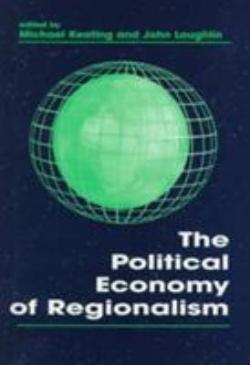Post-Cold War Identity Politics: Northern and Baltic Experiences (Routledge Studies in Nationalism and Ethnicity)

Buy online ($)
Type
Book
Authors
LEHTI ( Marko David J. Smith )
ISBN 10
0714654280
Category
POLITICAL SCIENCE-Relationship of States to other organised Groupsg
[ Browse Items ]
Publication Year
2003
Publisher
Frank Cass Publishers, United States
Pages
320
Subject
Post-communism--Europe, Northern. Post-communism--Baltic States. Security, International. Europe, Northern--Politics and government. Baltic States--Politics and government. Russia (Federation)--Foreign relations.
Tags
Abstract
During the past decade the northern part of Europe has again stared to assume an identity of its own within the new post-Cold War configuration of international relations. New images like the Baltic Sear Area and the Northern Dimension have blurred the hitherto dominant geopolitical categories of East and West whilst also challenging the old narrow conception of Nordic identity. The construction of a 'new' Europe has proved to be a far more open and contested project than it was often assumed that it would be at the start of the 1990s. Alongside new regional projects that aim to transcend national and old geopolitical divisions, one can simultaneously detect practices designed to create new dividing lines. Post-Cold War Identity Politics maps the politics of identity and the emerging forms of co-operation/interaction in this part of the world. In this way, it assesses whether the expanded conception of 'Northern-ness' has the potential to become a new marker on the map of Eruope. Of particular importance is the question of whether regional co-operation might yet bridge the divide between Russian and an ascendant and expansive Euro-Atlantic space. In this respect, the European North can be seen as a kind of litmus test for the new Europe as a whole. This book highlights the existence of several co-existing and - to some extent - competing region-building projects in northern Europe. What unites them is that they can all be comprehended as efforts by existing nations to redefine their role in Europe at a time when the meaning of sovereignty and boundaries is changing. The use of history is one of the main rhetorical moves in the process of relocating nations and naturalising new regions.
Description
During the past decade northern Europe has started to assume an identity of its own. Categories of East and West have become blurred, challenging as well the idea of what it means to be Nordic. Post-Cold War Identity Politics maps this process in Scandinavia. Looking at projects designed to help regional development in the Nordic countires, it assesses whether a new way of defining 'Northern-ness' is emerging. The book highlights the existence of co-existing and - to some extent - competing region-building projects in northern Europe. It demonstrates how they are all efforts by existing nations to redefine their role in Europe at a time of change, and points to how they might develop in the future. - from Amzon
Biblio Notes
Contents
Map ………………...................................................................... P. ix
List of Contributors ………………………………………..............................P. xi
List of Abbreviations ……………………………………...............................P. xiii
Series Editor's Preface ……………………………………............................P. xv
Foreword …………………………………………………….................................P. xvii
Introduction: Other Europes ……………………………….......................…P. 1
Marko Lehti and DavidJ. Smith
1. Possessing a Baltic Europe: Retold National ………….…................P. 11
Narratives in the European North
Marko Lehti
2. Nordic Near Abroad or New Northern Europe? ………….................P. 50
Perspectives on Post-Cold War Regional
Co-operation in the Baltic Sea Area
DavidJ. Smith
3. Past Politics in North-Eastern Europe: The Role………….................P. 78
of History in Post-Cold War Identity Politics
Jorg Hackman
4. From Modern to Post-Modern Region-Building: ………....................P. 101
Emancipating the Finnish Nation from the State
Christopher S. Browning
5. The Encounter between the Nordic and the Northern:……...............P. 128
Torn Apart but Meeting Again?
PerttiJoenniemi and Marko Lehti
6. Looking for Neighbours: Origins and Developments………................P. 157
of Latvian Rhetoric on Nordic 'Closeness'
Valters &Serbinskis
7. Regional Security: All or Nothing at All?.......................................P. 173
John Hiden
8. Estonia and Europe: A Common Identity or an Identity Crisis?.........P. 183
Vahur Made
9. Paradise Regained: The Conceptualization of Europe in the
Lithuanian Debate………………………………………………….............................…P. 199
Inga Pavlovaite
10. The Baltic States in Russian Foreign Policy Discourse: ……….............P. 219
Can Russia Become a Baltic Country?
Viatcheslav Morozov
11. Post-Soviet Geo-politics in the North of Europe …………..................…P. 253
Pami Aalto
12. Clash of the Boundaries? The European Union and …………................P. 275
Russia in the Northern Dimension
Hiski Haukkala
Map ………………...................................................................... P. ix
List of Contributors ………………………………………..............................P. xi
List of Abbreviations ……………………………………...............................P. xiii
Series Editor's Preface ……………………………………............................P. xv
Foreword …………………………………………………….................................P. xvii
Introduction: Other Europes ……………………………….......................…P. 1
Marko Lehti and DavidJ. Smith
1. Possessing a Baltic Europe: Retold National ………….…................P. 11
Narratives in the European North
Marko Lehti
2. Nordic Near Abroad or New Northern Europe? ………….................P. 50
Perspectives on Post-Cold War Regional
Co-operation in the Baltic Sea Area
DavidJ. Smith
3. Past Politics in North-Eastern Europe: The Role………….................P. 78
of History in Post-Cold War Identity Politics
Jorg Hackman
4. From Modern to Post-Modern Region-Building: ………....................P. 101
Emancipating the Finnish Nation from the State
Christopher S. Browning
5. The Encounter between the Nordic and the Northern:……...............P. 128
Torn Apart but Meeting Again?
PerttiJoenniemi and Marko Lehti
6. Looking for Neighbours: Origins and Developments………................P. 157
of Latvian Rhetoric on Nordic 'Closeness'
Valters &Serbinskis
7. Regional Security: All or Nothing at All?.......................................P. 173
John Hiden
8. Estonia and Europe: A Common Identity or an Identity Crisis?.........P. 183
Vahur Made
9. Paradise Regained: The Conceptualization of Europe in the
Lithuanian Debate………………………………………………….............................…P. 199
Inga Pavlovaite
10. The Baltic States in Russian Foreign Policy Discourse: ……….............P. 219
Can Russia Become a Baltic Country?
Viatcheslav Morozov
11. Post-Soviet Geo-politics in the North of Europe …………..................…P. 253
Pami Aalto
12. Clash of the Boundaries? The European Union and …………................P. 275
Russia in the Northern Dimension
Hiski Haukkala
Number of Copies
1
| Library | Accession No | Call No | Copy No | Edition | Location | Availability |
|---|---|---|---|---|---|---|
| Main | 258 |
322.54 LEH |
1 | Yes |




